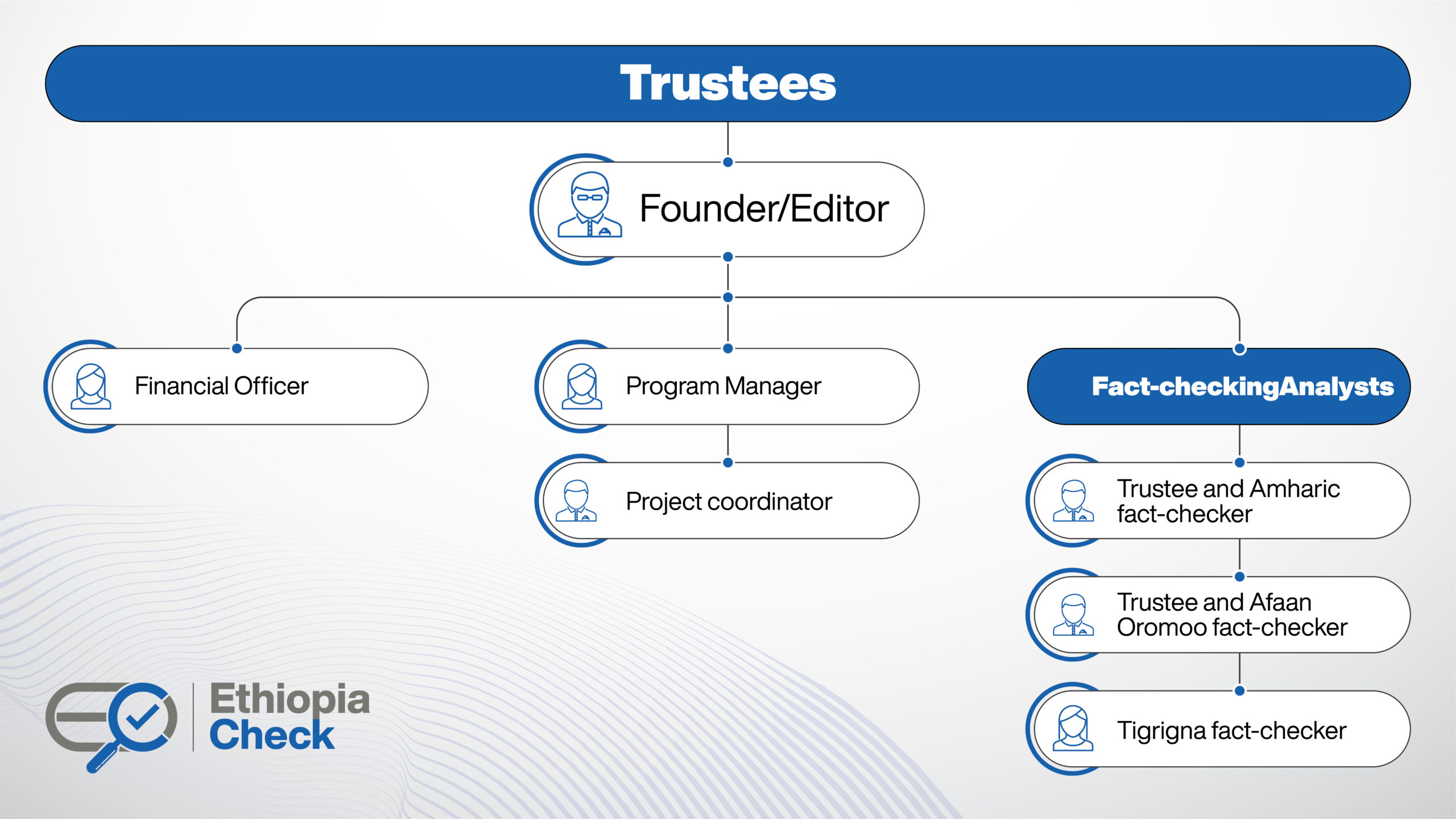About Ethiopia Check
Ethiopia Check is a fact-checking desk that was initially set up in June 2020. It is currently operating as a fully independent Trust Organization.
Ethiopia Check is a fact-checking desk that was initially set up in June 2020. It is currently operating as a fully independent Trust Organization.
Organizational Structure

EC legal status
Ethiopia Check is a legally registered non- profit fact-checking organization.
Policy of non-partisanship
As an independent and professional fact-checking organization, Ethiopia Check is committed to adhere to high standards of non-partisanship. For this to materialize, team members are properly trained on this policy upon joining the desk. The desk it is committed to execute these:
• Team members cannot support and/or campaign for any political party
• Team members cannot use company equipment/resources to support the causes of any political party or group
• Soliciting funds/money to conduct a fact-check for a certain political entity or individual is strictly forbidden
• Employees are not allowed to participate in political rallies or events in support of a certain political party or group.
• Personal opinions/biases cannot be a part of a fact-checking work
Note: Employees that violate these policies will be subjected to a fair scrutiny and then appropriate measures will be taken if found to be in violation.
Funding detail
Ethiopia Check is a registered Trust Organization. It receives grants from its partners to fund its activities (fact-checking, training, workshops) etc.
How we select claims to check
Ethiopia Check mostly selects claims based on the viral, sensitiveness and impact that they could have on the society. This way, important claims are taken in while others with less importance are left out. In addition, the desk makes sure that all sides to a story are included by constantly monitoring information and also reaching out to all stakeholders.
Here are the steps the desk follows:
Research:
Identification: Fact-checkers identify a claim made by a public figure or widely circulated on
social media or mainstream media.
Source Collection: Gathering primary sources related to the claim, including official statements,
documents, data from reliable institutions, and expert opinions.
Verification: The collected information is cross-referenced with independent sources or verified
using online tools.
Writing:
Drafting: Write a clear, concise report outlining the claim, the sources checked, and the
findings.
Review: The draft undergoes internal review to ensure impartiality and accuracy, with fact-
checkers and editors providing feedback.
Publishing:
Final Edits: After incorporating feedback, the report is edited for clarity and readability.
Publication: The final fact-check is published on Ethiopia Check’s website, often with
accompanying graphics and links to original sources.
Distribution:
The fact-check is shared through social media, newsletters, and media
partnerships to reach a wide audience and counter misinformation.
This meticulous process ensures that Ethiopia Check provides a reliable and transparent
information to the public.
Corrections and compliance policy
Please contact us if you think we have made a mistake in our fact-checking work and we will assess it at our earliest convenience. You can send your feedback, complaints or corrections to: info@ethiopiacheck.org or send us an SMS using +252974058699. If mistaken were made, Ethiopia Check will issue another separate story with a headline “Correction” and if finds it appropriate to provide further details to clear up issues, it will add an “Update” to the existing story. The desk will make every effort to check correction, complaints and feedbacks on a timely manner.
